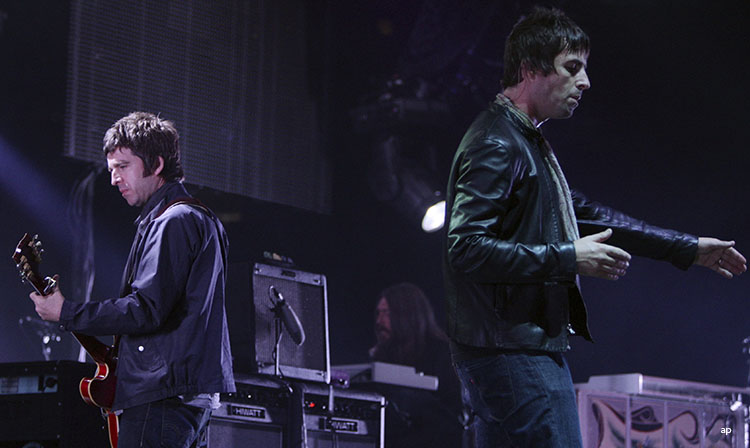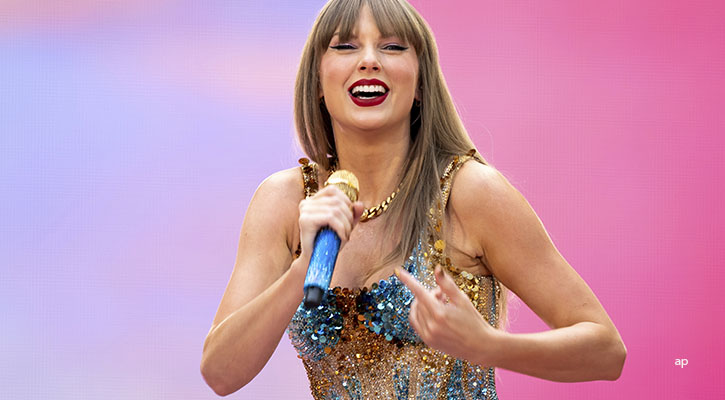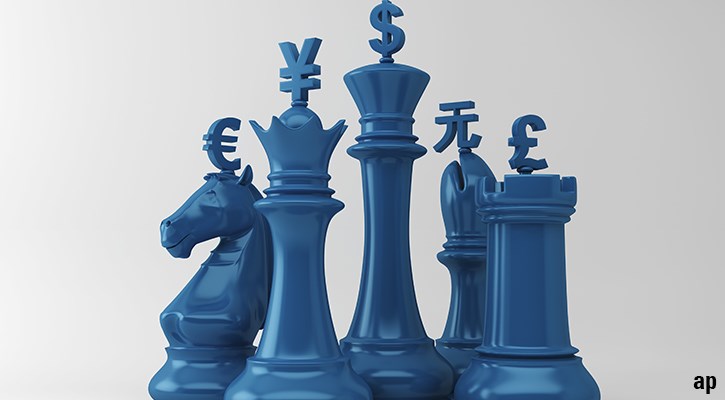
Update: Tickets went live to the general public on August 31. Fans encountered "dynamic pricing", where tickets can increase above their face value on legitimate sites like Ticketmaster. After a backlash from fans who missed out or paid above face value, MPs are now looking into the practice of dynamic pricing. The Oasis official site tweeted on August 31: "Tickets appearing on other secondary ticketing sites are either counterfeit or will be cancelled by the promoters." The UK Competition and Markets Authority has also launched an investigation.
Living with a superfan can be a costly business. Especially so when the band in question, Oasis, has just reformed after a 15-year hiatus and a seemingly-irreparable brotherly feud.
As well as sharing (some) of the household excitement about the return of the Manchester supergroup, there is the inevitable question of how much it's going to cost. Thousands, surely, in the end. Are there any investing lessons that can help ease the financial pain?
The last time I wrote about ticket prices, the Eras tour was yet to hit UK shores. Now, Taylor Swift has left town following sold-out concerts in June and August. But what felt like a significant international cultural event also added just a few basis points to the UK's monthly inflation figures in the process.
While the Oasis reunion is unlikely to eclipse the Swift industrial complex (remember: Oasis famously never "broke" America), the level of hype may be similar for fans of a certain age – I was a mere 21 years old when the band played to 250,000 people over a weekend at Knebworth in August 1996. That ticket cost me £22.50, but included a whole host of bands on the bill, including Manic Street Preachers and the Chemical Brothers. Let's just say it was a brilliant but exhausting experience...
Will The Oasis Reunion Stimulate The UK Economy?
Estimates of economic impact are hard to pin down exactly, but, as the Eras Tour shows, mega concerts make millions for the hospitality and transport sectors, as fans travel from all over the country to catch their favourite acts.
AJ Bell investment analyst Dan Coatsworth compares the upcoming Oasis mania to this year's Swift spending:
"Taylor Swift's recent run of UK dates has shown the public is willing to spend big when certain acts come to town," he says.
"Taylor Swift fans from across the globe descended on the country this summer, doling out cash on accommodation, travel, new outfits, food and drink, tickets and merchandise. Oasis should easily command the same fervour from the public.
"Reports suggest those concerts contributed £1 billion to the UK economy and there is the potential for Oasis to have a similar effect. The Eras Tour superstar played many of the same venues as those booked for the Oasis tour, and the number of concerts could also be similar if the band add extra dates to meet the expected high demand."
Nostalgia is a very lucrative tool for music promoters and bands, who can't rely on CD sales to fund their lifestyles any more. Streaming brings in decent income for the biggest acts but smaller bands now struggle to make decent bank from even the most packed schedules.
But you don't even have to be "old." The solo artist success of the band's two front-brothers, Liam and Noel Gallagher (the former defying both the cost of several divorces and a public fall from grace) suggests a new generation of fans has joined Oasis's fanbase.
Six Reasons People Pay Premium for Gigs
• There's a shortage of great stadium acts;
• Older people want to relive their youth and are willing and able to pay for it;
• People get caught up in FOMO and may lose their ordinarily-rational spending control;
• Post-pandemic, people want experiences and memories more than things;
• In an era of social anxiety and disconnection, gigs are a rare communal experience;
• The death of David Bowie in 2016 showed that music legends are ultimately ticking clocks.
How Much Will Oasis Reunion Tickets Cost?
When tickets are released at the weekend, mid-life fans will have to compete with their younger rivals as well as the supercomputers owned by "professional" touts. Early indications suggest prices won't be too excessive at between £100 and £150, the Manchester Evening News predicts. But that's a long way from the days when you could pay a tenner to see a brilliant band.
£100-£150 would be in line with Noel Gallagher gigs of recent years, but below the price of Liam Gallagher's Knebworth extravaganza of 2022, which sold for a face value of £65. For Oasis fans, Liam played six Oasis encores, including Live Forever and Champagne Supernova. The last time I saw Noel in March 2024 at the Royal Albert Hall, tickets cost £95 and he closed off with Don't Look Back in Anger.
There are other factors to consider. Oasis tickets will be in huge demand but they may not be "expensive" compared to other global acts and other days out – like Test cricket, Formula One, Wimbledon, or even Premier League football matches. Stadium tickets for The Rolling Stones or U2 are always "competitively priced," for example. Oasis may provide better value for money – if fans are lucky enough to secure tickets.
Investors and Music Fans Are Mad Fer it: is That Bad?
Morningstar.co.uk is a site for personal investors, so what does this article on middle-aged rock stars mean for them? Apart from giving an insight into consumer spending patterns, it may have some wider lessons.
Nudge economics is skilfully used by ticketing sites and promoters in the run-up to a hyped tour. A set of shows may be "sold out" (cue disappointment), only for new dates to be announced "due to exceptional demand", triggering a new wave of excitement. The tactic is nothing new, but the delivery method is modern: you may get a phone notification urging you to "act now" to secure your tickets. Sometimes a "sold out" show may not be sold out at all.
As in the entertainment industry, the stock market is not immune to mania, and investors are just as vulnerable as music fans to losing control of their senses. Are Taylor Swift fans paying thousands to ticket touts any different from those who went mad over dotcom stocks in 1999 and (possibly) the AI vanguards like Nvidia (NVIDIA)?
Perceived scarcity is also a factor in driving prices. It is certainly used by bitcoin advocates, and, before them, gold devotees. If something desirable is finite, then people are usually prepared to pay over the odds. In the case of Oasis tickets, this won't affect the face value of the tickets, which is fixed, but it will ramp up the cost for fans forced into the vast shadow industry of secondary ticketing.
Ticket touts used to be shady men hanging around venues grasping wodges of cash, but now they use high-spec computers and algorithms to beat your average punter to the prize. It's not a level playing field, but fairness goes out of the window when it comes to making profits. Could the same be said for retail investors and professionals?
When markets move like they did on August 6, amateur investors can't respond quickly enough because investment banks, trading houses and hedge funds have the computing capacity and professional awareness to exit positions before you and I. (Author Michael Lewis wrote about this technological edge in his 2014 book Flash Boys. Ten years on, AI-driven computing is even more sophisticated.)
I Married an Oasis Superfan, Get Me Out of Here
In an attempt at self-awareness, perhaps it's worth considering the Oasis reunion may also be a good example of the sunk-cost fallacy, which the Oxford English Dictionary describes as: "a person is reluctant to abandon a strategy or course of action because they have invested heavily in it, even when it is clear that abandonment would be more beneficial."
For investor this would manifest as a reluctance to sell even though the facts suggest it might be better for you to cut your losses. This tendency increases with the amount invested - if you put your whole ISA allowance of £20,000 in one stock (advisers don't recommend this) and it fell 50% in one year, there's a tendency to wait to recover the lost money, even though statistically you now have a much harder climb back to your original investment. And if the share falls another 50% the next year, the sunk cost fallacy has cost you £15,000.
Over the decades, my household has spent thousands of pounds on the Oasis machine, pursuing the solo careers of its singer and guitarist and buying the coloured, remastered vinyl albums each time they're reissued. And then there's the emotional investment: my wife has written a novel about the Britpop scene and launched her own podcast series interviewing the great and good of that era.
Is this a case of Get Out While You Can (James Bay) or It's Too Late to Stop Now (Van Morrison)? Some might say that. Me? I think it's going to be a brilliant tour. I'll stop crying my heart out.
Methodology note: Ticket prices are face value, general admission standing where possible as these are considered the "default" option when booking. Venues are generally London based, where ticket prices tend to be higher than in the rest of the country. I've tried to exclude service charges/venue charges/admin charges/handling where possible, but they are a growing and controversial part of the overall ticket price. Ticket insurance is the latest frictional element to push prices up further.




























